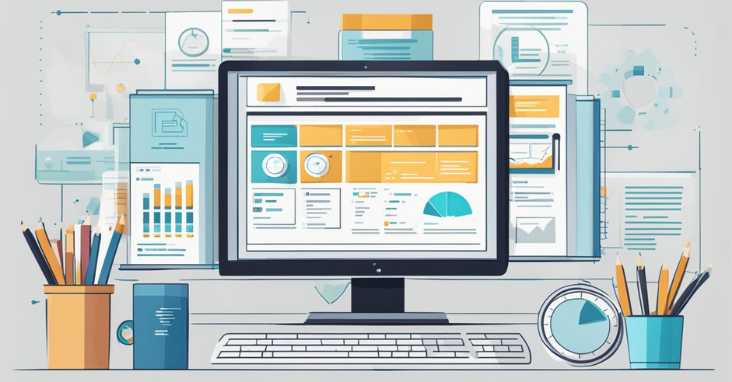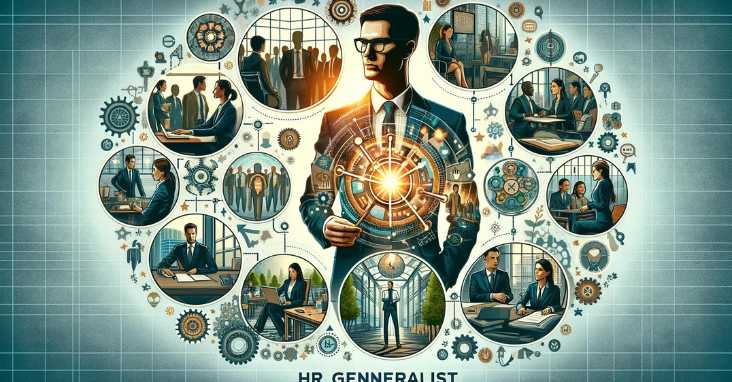Hr generalist job description, what are their key responsibilities? HR Generalists handle recruitment, training, benefits, compliance, and employee relations. They ensure workplace harmony and efficiency.
HR generalists play a crucial role in managing the human resources of an organization. They are responsible for a wide range of tasks, including recruitment, employee relations, performance management, training and development, compliance, and strategic planning. The job of an HR generalist is dynamic and requires a diverse set of skills and qualifications.

The role of an HR generalist is to serve as a liaison between the management and employees. They ensure that the organization’s policies and procedures are followed, and employees are treated fairly. They also play a key role in recruitment, staffing, training, and development of employees. Additionally, they are responsible for ensuring that the organization complies with all relevant laws and regulations.
If you are interested in pursuing a career in human resources, becoming an HR generalist can be a great starting point. In this article, we will provide an overview of the HR generalist job description, including the qualifications and skills required, recruitment and staffing, training and development, compensation and benefits, compliance and policies, performance management, employee relations and engagement, HR technology and data, and administrative and strategic tasks. We will also answer some frequently asked questions about the role of an HR generalist.
Role Overview
The HR Generalist is a key member of the Human Resources department who plays a vital role in providing support to the organization and its employees. This section provides an overview of the key responsibilities, position in the HR department, and scope of work for an HR Generalist.
Key Responsibilities
The HR Generalist is responsible for a wide range of duties related to the management of the organization’s human resources. Some of the key responsibilities of an HR Generalist include:
- Supporting the recruitment and selection process
- Managing employee relations and resolving conflicts
- Administering employee benefits and compensation programs
- Developing and implementing HR policies and procedures
- Conducting training and development programs for employees
- Ensuring compliance with employment laws and regulations
Position in the HR Department
As a member of the HR department, the HR Generalist reports to the HR Manager or Director and works closely with other members of the HR team. They may also work closely with managers and supervisors in other departments to ensure that HR policies and procedures are being followed.
Scope of Work
The scope of work for an HR Generalist can vary depending on the size and complexity of the organization. In smaller organizations, the HR Generalist may be responsible for all aspects of HR management, while in larger organizations, they may specialize in a particular area of HR such as recruitment or employee relations.
Overall, the HR Generalist plays a crucial role in ensuring that the organization’s human resources are effectively managed and that employees are supported in their work. For more information on HR Generalist job descriptions and responsibilities, visit SHRM.org.
Qualifications and Skills
Education and Certifications
To become an HR Generalist, a bachelor’s degree in human resources, business administration or a related field is typically required. Additionally, obtaining a certification in human resources, such as the Professional in Human Resources (PHR) or the Senior Professional in Human Resources (SPHR), can demonstrate a higher level of expertise and commitment to the field. The Society for Human Resource Management (SHRM) offers a variety of certifications that can enhance an HR Generalist’s credentials.
Essential Skills
An HR Generalist must possess strong communication skills, both written and verbal, to effectively communicate with employees and management. They must also have excellent problem-solving skills to handle complex issues that arise in the workplace. Attention to detail is crucial when handling sensitive employee information and ensuring compliance with legal requirements. Additionally, an HR Generalist must have strong interpersonal skills to build relationships with employees and management.
Desired Experience
Experience in a human resources role is highly desirable for an HR Generalist. This can include experience in recruitment, employee relations, benefits administration, and performance management. Knowledge of employment laws and regulations is also important. An HR Generalist who has worked in a variety of HR roles can bring a diverse range of skills and knowledge to the position.
Overall, an HR Generalist must possess a combination of education, certifications, and skills to effectively perform their role. By having a strong foundation in human resources, an HR Generalist can navigate the complexities of the workplace and provide valuable support to both employees and management.
For more information on becoming an HR Generalist, visit the SHRM website.
Recruitment and Staffing
Talent Acquisition
As an HR Generalist, one of the primary responsibilities is to ensure that the organization attracts and hires the best possible candidates for open positions. This process, known as talent acquisition, involves various steps that include job posting, candidate screening, interviewing, and selection.
To ensure that the recruitment process is efficient and effective, HR Generalists must have a clear understanding of the job requirements and the skills and qualities that the ideal candidate should possess. They must also be adept at using various recruitment channels, such as job boards, social media, and employee referrals, to reach a diverse pool of candidates.
Once potential candidates are identified, the HR Generalist must conduct thorough screening and interviewing to determine if they are a good fit for the position and the organization. This involves assessing their skills, experience, personality, and cultural fit.
Onboarding New Hires
Once a candidate is selected, the HR Generalist is responsible for ensuring that the onboarding process is smooth and effective. Onboarding involves orienting the new hire to the organization’s culture, policies, and procedures, as well as providing them with the necessary training and resources to perform their job effectively.
The HR Generalist must work closely with the new hire’s manager and team to ensure that they are integrated into the organization and feel welcomed. This involves providing them with a clear understanding of their job responsibilities, the organization’s goals and objectives, and the resources available to support their success.
To ensure that the onboarding process is effective, HR Generalists must have a clear understanding of the employee onboarding process and best practices. They must also be able to develop and implement effective onboarding programs that meet the needs of the organization and the new hire.
For more information on talent acquisition and employee onboarding, check out this resource from the Society for Human Resource Management.
Training and Development

Employee Training Programs
As an HR Generalist, one of the primary responsibilities is to develop and implement training programs for employees. These programs are designed to improve employee skills, knowledge, and overall performance. The training programs may include on-the-job training, classroom instruction, workshops, and online courses.
The HR Generalist must work closely with department managers and supervisors to identify training needs and develop programs that address those needs. The training programs may cover a wide range of topics, including customer service, safety, communication, and technical skills.
To ensure that the training programs are effective, the HR Generalist must evaluate the performance of employees before and after the training. This evaluation helps to determine the effectiveness of the training and identify areas for improvement.
Career Advancement Opportunities
Another important responsibility of an HR Generalist is to develop career advancement opportunities for employees. This involves identifying potential career paths within the organization and developing programs that help employees acquire the skills and experience needed to advance their careers.
The HR Generalist may work with department managers to create job descriptions and identify the qualifications necessary for each position. They may also develop mentorship programs, job shadowing opportunities, and leadership development programs to help employees acquire the skills and experience needed to advance their careers.
By providing employees with career advancement opportunities, the organization can retain valuable employees, improve employee morale, and increase productivity.
To learn more about designing effective employee training programs and career advancement opportunities, visit the Society for Human Resource Management website.
Compensation and Benefits

Salary and Payroll
One of the primary responsibilities of an HR Generalist is to manage payroll and ensure that employees are paid accurately and on time. This includes calculating salaries, deductions, and taxes, as well as managing employee benefits such as health insurance, retirement plans, and paid time off. The HR Generalist must also ensure compliance with state and federal regulations related to payroll and employee benefits.
To ensure accurate and timely payroll processing, HR Generalists may use payroll software or work with a third-party payroll provider. They must also maintain accurate records of employee pay and benefits, and be able to answer employee questions related to their compensation.
Employee Benefits Management
Employee benefits are an important part of compensation and can be a significant factor in attracting and retaining top talent. HR Generalists are responsible for managing employee benefits programs, which may include health insurance, retirement plans, and other perks such as tuition reimbursement or gym memberships.
HR Generalists must stay up-to-date with the latest trends and best practices related to employee benefits, and ensure that their organization’s benefits packages are competitive and meet the needs of their employees. They must also communicate benefits information to employees and help them navigate the enrollment process.
One resource that can be helpful for HR Generalists in managing employee benefits is the Society for Human Resource Management (SHRM). SHRM offers a variety of resources and tools related to compensation and benefits, including research reports, webcasts, and online courses.
Overall, the HR Generalist plays a critical role in managing compensation and benefits for an organization and ensuring that employees are fairly compensated and have access to valuable benefits programs.
Compliance and Policies

As an HR Generalist, ensuring compliance with both regulatory requirements and company policies and procedures is a critical aspect of the job. This section will discuss the importance of regulatory compliance and company policies in the workplace.
Regulatory Compliance
HR Generalists must be knowledgeable about labor laws and employment laws to ensure that their organization is in compliance with all applicable regulations. This includes laws related to anti-discrimination, equal employment opportunity, wage and hour, and workplace safety. Failure to comply with these laws can result in legal penalties, fines, and damage to the organization’s reputation.
One resource that HR Generalists can use to stay up-to-date on regulatory compliance is the website of the U.S. Department of Labor. The website provides information on a variety of employment laws, including the Fair Labor Standards Act, the Family and Medical Leave Act, and the Occupational Safety and Health Act. HR Generalists can also consult with legal counsel to ensure that their organization is in compliance with all applicable laws.
Company Policies and Procedures
In addition to regulatory compliance, HR Generalists must also ensure that their organization has effective policies and procedures in place to govern employee behavior. This includes policies related to workplace conduct, attendance, leave, and performance expectations. Effective policies and procedures can help prevent workplace conflicts and ensure that all employees are treated fairly and consistently.
HR Generalists can work with management to develop and implement policies and procedures that align with the organization’s values and goals. It is also important to regularly review and update policies and procedures to ensure that they remain relevant and effective.
One resource that HR Generalists can use to develop effective policies and procedures is the Society for Human Resource Management (SHRM). SHRM provides a variety of resources, including sample policies and procedures, to help HR professionals develop effective workplace policies.
In conclusion, compliance with regulatory requirements and effective company policies and procedures are essential for the success of any organization. HR Generalists play a critical role in ensuring that their organization is in compliance with all applicable laws and has effective policies and procedures in place to govern employee behavior.
Performance Management

Performance management is a crucial aspect of any HR Generalist’s job description. It involves the process of setting goals, monitoring progress, and providing feedback to employees to improve their performance. The two main subsections of performance management are evaluations and feedback, and performance improvement.
Evaluations and Feedback
Evaluations and feedback are essential for tracking employee progress and identifying areas for improvement. HR Generalists are responsible for conducting regular performance evaluations to assess employee performance and provide constructive feedback. These evaluations can be formal or informal, depending on the company’s policies and procedures.
During the evaluation process, HR Generalists use a variety of tools to assess employee performance, such as self-assessments, peer reviews, and supervisor evaluations. The feedback provided during the evaluation process is critical for employee development and growth. It helps employees understand their strengths and weaknesses and identify areas where they need to improve.
Performance Improvement
Performance improvement is another critical aspect of performance management. HR Generalists are responsible for identifying areas where employees need to improve and developing plans to help them achieve their goals. This can involve providing additional training, coaching, or mentoring to employees.
HR Generalists also work with managers and supervisors to develop performance improvement plans for employees who are not meeting performance standards. These plans outline specific steps that employees need to take to improve their performance and achieve their goals.
Overall, performance management is a critical part of an HR Generalist’s job description. It involves setting goals, monitoring progress, and providing feedback to employees to improve their performance. By doing so, HR Generalists help employees reach their full potential and contribute to the success of the organization.
Here is a link to a performance management toolkit by SHRM, a highly respected authority on HR practices.
Employee Relations and Engagement

As an HR Generalist, one of the key responsibilities is to ensure that employees are engaged and satisfied with their work environment. This involves managing employee relations, maintaining workplace morale, and fostering a positive company culture.
Conflict Resolution
One of the primary aspects of employee relations is managing conflicts and disputes that arise within the workplace. HR Generalists are responsible for investigating and resolving employee grievances, ensuring that all parties involved are treated fairly and with respect. This involves conducting thorough investigations, mediating discussions, and implementing solutions that are in line with company policies and legal regulations.
To help facilitate conflict resolution, HR Generalists may provide training to employees and managers on effective communication, conflict resolution, and problem-solving techniques. This can help prevent conflicts from escalating and ensure that employees are able to work together productively.
Workplace Morale and Culture
Maintaining a positive workplace culture and high morale is essential for employee engagement and retention. HR Generalists play a key role in fostering a positive work environment by implementing programs and initiatives that promote employee well-being and job satisfaction.
This can include organizing team-building activities, providing recognition and rewards for outstanding performance, and creating opportunities for employee development and growth. HR Generalists may also conduct employee surveys and focus groups to gather feedback on workplace culture and identify areas for improvement.
To learn more about effective employee engagement strategies, check out this resource from the Society for Human Resource Management.
HR Technology and Data

The role of an HR Generalist has evolved over the years, and with the increasing use of technology in the workplace, it has become essential for HR professionals to have a good understanding of HR technology and data. This section will discuss the importance of HR technology and data in the HR Generalist job description.
Human Resources Information Systems
Human Resources Information Systems (HRIS) are essential tools that HR Generalists use to manage employee data, track employee performance, and monitor compliance with labor laws. HRIS systems can help HR Generalists to automate many of their administrative tasks, such as employee onboarding, benefits administration, and payroll processing.
One of the benefits of using an HRIS system is that it can help HR Generalists to streamline their workflow and reduce the time spent on administrative tasks. This allows HR Generalists to focus on more strategic tasks, such as talent management and employee engagement.
Data Analysis and Reporting
Data analysis and reporting are critical skills for HR Generalists. HR Generalists must be able to analyze HR metrics and use them to make informed decisions about employee management. HR metrics can provide valuable insights into employee performance, turnover rates, and the effectiveness of HR programs.
HR Generalists must also be able to create reports that provide insights into HR metrics. These reports can be used to communicate HR data to senior management and other stakeholders. HR Generalists must be able to present this data in a clear and concise manner, using tables, charts, and other visual aids to help convey the information.
In conclusion, HR technology and data are essential components of the HR Generalist job description. HR Generalists must have a good understanding of HRIS systems, data analysis, and reporting to be effective in their roles. By leveraging technology and data, HR Generalists can streamline their workflow, improve employee management, and make informed decisions about HR programs. For more information on HR technology and data, visit the Society for Human Resource Management (SHRM) website.
Administrative and Strategic Tasks

HR Generalists are responsible for a wide range of administrative and strategic tasks within an organization. These tasks range from day-to-day HR operations to long-term strategic HR planning. In this section, we will explore these tasks in more detail.
Day-to-Day HR Operations
One of the primary responsibilities of an HR Generalist is to manage day-to-day HR operations. This includes tasks such as managing employee files, processing payroll, and administering benefits. HR Generalists are also responsible for ensuring that the organization complies with all relevant labor laws and regulations.
To effectively manage day-to-day HR operations, HR Generalists must have strong organizational skills and attention to detail. They must also be able to communicate effectively with employees, managers, and other stakeholders.
Strategic HR Planning
In addition to managing day-to-day HR operations, HR Generalists are also responsible for strategic HR planning. This includes developing and implementing HR policies and procedures, as well as identifying and addressing HR challenges and opportunities.
To effectively carry out strategic HR planning, HR Generalists must have a deep understanding of the organization’s goals and objectives. They must also be able to analyze data and make data-driven decisions. Finally, they must be able to communicate effectively with senior leaders and other stakeholders.
One useful resource for HR Generalists looking to improve their strategic planning skills is the Society for Human Resource Management (SHRM). SHRM offers a wide range of resources, including webinars, conferences, and online courses, to help HR professionals develop their skills and stay up-to-date on the latest HR trends and best practices.
Frequently Asked Questions

What are the primary duties and responsibilities of an HR Generalist?
HR Generalists are responsible for a wide range of tasks related to human resources, including recruitment, employee relations, benefits administration, performance management, and compliance with employment laws and regulations. They are also involved in developing and implementing HR policies and procedures, as well as providing guidance and support to managers and employees.
What qualifications and skills are required for a role as an HR Generalist?
Typically, HR Generalists are required to have a bachelor’s degree in human resources, business administration, or a related field. They should also have several years of experience in HR, as well as strong communication, problem-solving, and organizational skills. Knowledge of employment laws and regulations is also essential.
How does an HR Generalist’s role differ from that of an HR Specialist?
While both HR Generalists and HR Specialists work in human resources, their roles differ in several ways. HR Generalists have a broader range of responsibilities and are involved in all aspects of HR, while HR Specialists focus on specific areas such as recruitment, compensation, or benefits. HR Generalists also tend to work in smaller organizations, while HR Specialists are more common in larger companies.
What is the typical career progression for an HR Generalist?
According to the Bureau of Labor Statistics, HR Generalists can advance to higher-level HR positions such as HR Manager or Director. They can also specialize in areas such as compensation, benefits, or training and development.
What are the expected salary ranges for an HR Generalist at various experience levels?
According to Glassdoor, the national average salary for an HR Generalist is $63,000 per year. However, salaries can vary based on experience, location, and industry. Entry-level HR Generalists can expect to earn around $45,000 per year, while those with several years of experience can earn upwards of $80,000 per year.
How do HR Generalist responsibilities vary across different industries or organization sizes?
The specific responsibilities of an HR Generalist can vary based on the size and industry of the organization. For example, HR Generalists in healthcare may be responsible for managing employee health benefits, while those in manufacturing may be involved in safety and compliance issues. Additionally, HR Generalists in smaller organizations may have a broader range of responsibilities than those in larger companies.
For more information on HR Generalist job descriptions, please visit the Society for Human Resource Management.















